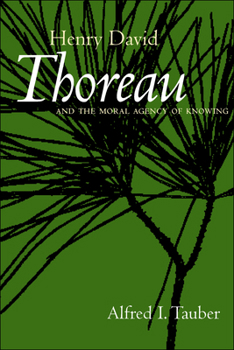Henry David Thoreau and the Moral Agency of Knowing
Select Format
Select Condition 
Book Overview
In his graceful philosophical account, Alfred I. Tauber shows why Thoreau still seems so relevant today--more relevant in many respects than he seemed to his contemporaries. Although Thoreau has been skillfully and thoroughly examined as a writer, naturalist, mystic, historian, social thinker, Transcendentalist, and lifelong student, we may find in Tauber's portrait of Thoreau the moralist a characterization that binds all these aspects of his career...
Format:Paperback
Language:English
ISBN:0520239156
ISBN13:9780520239159
Release Date:May 2003
Publisher:University of California Press
Length:328 Pages
Weight:1.00 lbs.
Dimensions:0.9" x 6.1" x 9.0"
Customer Reviews
1 rating
Thoreau's Response to Post- Modernism
Published by Thriftbooks.com User , 22 years ago
This is a book for two kinds of readers. Those who are particularly drawn to Thoreau will find a provocative thesis on which to hang all of his various pursuits. Tauber approaches him as a historian and philosopher of science, and shows how Thoreau was reacting against a rising tide of positivism - a form of radical objectivity -- to preserve his individualistic perspective on the world. Whether he was doing natural history or cultural history, Thoreau collected facts and assembled them to uniquely construct his own view of nature or culture. But Thoreau is only a foil for Tauber's larger purposes. Tauber's major theme is that all knowledge is value-laden and we choose the values by which to know the world and live in it. The fact/value distinction, so important in much of philosophy of science, is brought together here. This thesis is of interest, not only to understand Thoreau, but for a very much wider set of concerns. Tauber is charting out a post-critical understanding of the nature of knowledge, building on two philosophies: Michael Polanyi's "tacit mode" of understanding and Emanuel Levinas's ethical metaphysics. The first argues that the conditions that make knowing possible are not "foundational" or can ever be made explicit, but rather are embedded in individual experience and common social life; from this source, explicit knowledge is created. The second thesis maintains that values determine how we encounter the world and ultimately know it. These themes are not novel to contemporary philosophy, but when posed in present debates about the nature of reality, the claims of relativism, and the problematic status of the self, Tauber's synthesis offers a way out of the maze of postmodernism to new assertions about the primacy of the person. Thoreau is used to demonstrate how the postmodern challenge has its origins in the romanticism and that the responses offered then, when understood in the light of 20th century developments, takes on new significance. This is an ambitious book: The Thoreau lover will find some of the philosophy challenging and the philosophically inclined will find the focus on Thoreau potentially distracting. But each will find their efforts well paid: the first will understand Thoreau in a new way, and the second will see a philosophy enacted in a rarely realized illustration.





